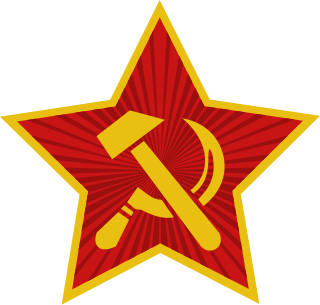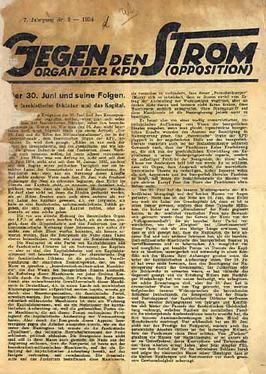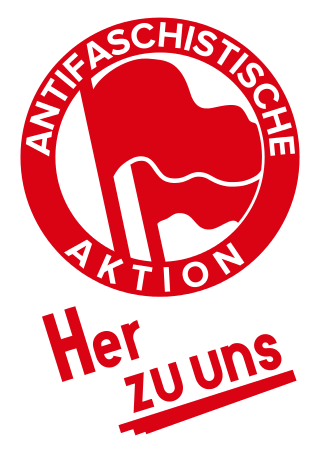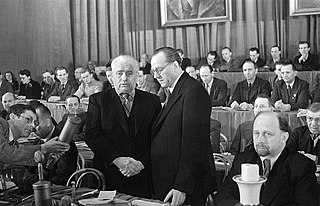
The Social Democratic Party of Germany is a centre-left social democratic political party in Germany. It is one of the major parties of contemporary Germany.

The Communist Party of Germany was a major political party in the Weimar Republic between 1918 and 1933, an underground resistance movement in Nazi Germany, and a minor party in West Germany in the postwar period until it was banned by the Federal Constitutional Court in 1956.

The German Communist Party is a communist party in Germany. The DKP supports left positions and was an observer member of the European Left. At the end of February 2016 it left the European party.
In the fourteen years the Weimar Republic was in existence, some forty parties were represented in the Reichstag. This fragmentation of political power was in part due to the use of a peculiar proportional representation electoral system that encouraged regional or small special interest parties and in part due to the many challenges facing the nascent German democracy in this period.

The Communist Party of Germany (Opposition) (German: Kommunistische Partei Deutschlands (Opposition)), generally abbreviated as KPO or KPD(O), was a communist opposition organisation established at the end of 1928 and maintaining its existence until 1939 or 1940. After the rise of Adolf Hitler and the Nazi Party to power in January 1933, the KPO existed only as an illegal and underground organization. The group initially sought to modify, later to replace, the mainstream Communist Party of Germany (KPD) headed by Ernst Thälmann. The KPO was the first national section affiliated to the International Communist Opposition (ICO).

Antifaschistische Aktion was a militant anti-fascist organisation in the Weimar Republic started by members of the Communist Party of Germany (KPD) that existed from 1932 to 1933. It was primarily active as a KPD campaign during the July 1932 German federal election and the November 1932 German federal election and was described by the KPD as a "red united front under the leadership of the only anti-fascist party, the KPD."
Heinrich Brandler was a German communist, trade unionist, politician, revolutionary activist, and political writer. Brandler is best remembered as the head of the Communist Party of Germany (KPD) during the party's ill-fated "March Action" of 1921 and aborted uprising of 1923, for which he was held responsible by the Communist International. Expelled from the Communist Party in December 1928, Brandler went on to become co-founder of the Communist Party of Germany Opposition, the first national section of the so-called International Right Opposition.
Albert Buchmann was a German politician. He was a member of the Communist Party of Germany (KPD) and was Reichstag deputy of the party from 1924 to 1933.

Robert Siewert was a German politician who fought in the German Resistance against National Socialism. He is a survivor of Buchenwald concentration camp, where he helped save the life of Stefan Jerzy Zweig, among others.

The Communist Party of Germany (KPD) and the Social Democratic Party of Germany (SPD) merged to form the Socialist Unity Party of Germany (SED) on 21 April 1946 in the territory of the Soviet occupation zone. It is considered a forced merger. In the course of the merger, about 5,000 Social Democrats who opposed it were detained and sent to labour camps and jails.
Das Volksrecht was a left-wing newspaper published from Offenbach am Main, Weimar Germany between 1925 and 1933. Initially it was an irregular publication of the communist city council group, but in 1928 it became a local mouthpiece of the Right Opposition. It was published on a weekly basis until the National Socialist takeover in 1933.

Das Volk was a daily newspaper published from Berlin, Germany. It was the central organ of the Social Democratic Party of Germany (SPD). The first issue of Das Volk was published on 7 July 1945. Das Volk was the second working class-newspaper to emerge in Berlin after the Second World War. During its first twenty days of publishing, Das Volk was printed in Berliner format. Das Volk heeded the calls of the Communist Party of Germany (KPD) for building an anti-fascist democratic Germany, a parliamentary-democratic republic and unity of the working class. The newspaper was controlled by the left-wing tendency inside SPD, and supported merger of the party with KPD.

The Spartacus League was a Marxist revolutionary movement organized in Germany during World War I. It was founded in August 1914 as the International Group by Rosa Luxemburg, Karl Liebknecht, Clara Zetkin, and other members of the Social Democratic Party of Germany (SPD) who were dissatisfied with the party's official policies in support of the war. In 1916 it renamed itself the Spartacus Group and in 1917 joined the Independent Social Democratic Party of Germany (USPD), which had split off from the SPD as its left wing faction. During the November Revolution of 1918 that broke out across Germany at the end of the war, the Spartacus Group re-established itself as a nationwide, non-party organization called the "Spartacus League" with the goal of instituting a soviet republic that would include all of Germany. It became part of the Communist Party of Germany (KPD) when it was formed on 1 January 1919 and at that point ceased to exist as a separate entity.
Willi Dickhut was a German communist and cofounder of the Marxist–Leninist Party of Germany.
Marie Martha Schlag was a German politician. During the Weimar period she sat as a member of the Saxony regional parliament . Later, in April 1946, she was a delegate at the party conference which enacted the contentious merger that gave rise to the Socialist Unity Party (SED), after 1949 the ruling party in a new kind of one-party dictatorship, the Soviet sponsored German Democratic Republic.

Willi Birkelbach CBE was a West German politician (SPD). He was a member of the West German Bundestag between 1949 and 1964. Between 1952 and 1964 he also served as an increasingly prominent Member of the European Parliament.
Aloys Georg Rink was a German politician. He served as a member of the Landtag in the so-called People's State of Hesse between 1921 and 1922 and again between 1931 and 1933. After 1945, with Hesse now a part of the US occupation zone until May 1949, and thereafter a constituent element of the Federal Republic of Germany, Rink served as a member of the Landtag of Hesse between December 1946 and November 1950.

The Lenin League was a German revolutionary socialist organisation that was active during the later period of the Weimar Republic. Founded in 1928 by former left communist members of the Communist Party of Germany (KPD), it experienced a number of splits over the years before going underground in the wake of the Reichstag fire and finally disappearing by the outbreak of World War II.
The Communist Working Group was a political faction in Thuringia, Germany. KAG was founded by the Landtag of Thuringia members Otto Geithner, Agnes Schmidt and Hans Schreyer, whom had constituted an ultra-left faction in the Communist Party of Germany (KPD). Geithner and Schreyer had been expelled from KPD, whilst Schmidt resigned from the party to join KAG.











